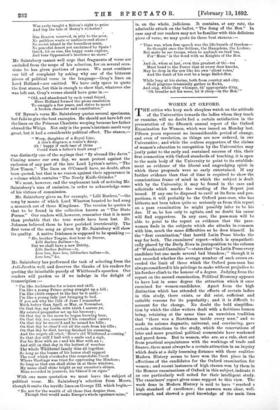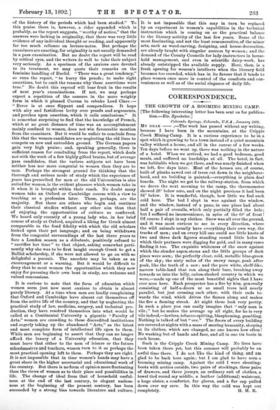WOMEN AT OXFORD.
THE critics who keep such sleepless watch on the attitude of the Universities towards the ladies whom they teach or examine, will no doubt feel a certain satisfaction in the presentation of the fifteenth annual report of the Oxford Examination for Women, which was issued on Monday last. Fifteen years represent no inconsiderable period of change, and even of revolution, as things are now ordered, in our Universities ; and while the zealous supporters of the claims of women's education to recognition by the Universities may justly point to the early and sustained success of this, their first connection with Oxford standards of teaching, it is open to the main body of the University to point to its establish- ment as evidence of the liberal and ungrudging spirit in which these proposals were so early entertained. If any further evidence than that of time is required to show the conscientious frame of mind in which the subject is dealt with by the University, it may be found in the care and solicitude which marks the wording of the Report just issued. If any one be disposed to cavil at its form and pro- portions, it will probably be the Oxford pass-man, who has hitherto not been taken quite so seriously as from this report on a pass examination he might possibly infer to be his due. If so, he has only to agitate, and no doubt his cause will find supporters. In any case, the pass-man will be able to point to the report as evidence that the pass- woman finds in the subjects which she attacks in common with him, much the same difficulties as he does himself. In the " first examination," that horrid Latin Prose blocks the way for both. The examiners' report—which is sympatheti- cally placed by the Daily News in juxtaposition to the column of "Wrecks and Casualties "—states that "in Latin Prose every candidate but one made several bad blunders ; " though it is not recorded whether the average number of such errors ex- ceeded the limit of three which the Oxford pass-man has always considered it his privilege to make without prejudice to his further climb to the honour of a degree. Judging from the report on the second examination, Political Economy appears to have lost in some degree the attraction which it once exercised for women-candidates. Apart from the high distinction which has attended the efforts of certain ladies in this study, there exists, or did exist, sufficient and suitable reasons for its popularity ; and it is difficult to account for the change. No doubt the bold simplifica- tion by which the older writers dealt with a fictitious human being, retaining at the same time an unwritten tradition that "there was a Scotchman inside every man," and so made its axioms dogmatic, universal, and convincing, gave certain attractions to the study, which the reservations of later and more practical political economists have weakened and pared down. But to women, who are, as a rule, shut out from practical acquaintance with the workings of trade and finance, there must always be a certain attraction in an inquiry which deals at a daily lessening distance with these realities. Modern History seems to have won the first place in the affections of the candidates for the Oxford examination for women ; and recent instances of high classes won by them in the Honour examinations of Oxford in this subject, indicate it as one particularly well suited for their intelligent study. The examiners' report gives some support to this view. The work done in Modern History is said to have " reached a high standard of excellence ; the answers were clear, well- arranged, and showed a good knowledge of the main. lines of the history of the periods which had been studied." To this praise there is, however, a rider appended which is probably, as the report suggests, "worthy of notice," that the answers were lacking in originality, that there was very little evidence of any individual thought or reading, and apparently far too much reliance on lecture-notes. But perhaps the examiners are exacting, for originality is not usually demanded in a pass examination. But no doubt the report will be read by critical eyes, and the writers do well to take their subject very seriously. As a specimen of the anxious care devoted to its treatment, we may quote their remarks on the feminine handling of Euclid. " There was a great tendency," so runs the report, " to hurry the proofs ; to make right assertions, but to omit the reasons why these assertions were true." No doubt this reproof will bear fruit in the results of next year's examinations. If not, we may perhaps expect a repetition of the censure in the more weighty form in which it pleased Curran to rebuke Lord Clare :— " Error is at once flippant and compendious. It hops with airy and fastidious levity over proofs and arguments, and perches upon assertion, which it calls conclusions." It is somewhat surprising to find that the knowledge of French, which at no great distance of time was an accomplishment mainly confined to women, does not win favourable mention from the examiners. But it would be unfair to conclude from this that the women-candidates are neglecting the old lines to ,compete on new and untrodden ground. The German papers gain very high praise ; and, speaking generally, there is sufficient reason for concluding from the report, which deals not with the work of a few highly gifted brains, but of average pass candidates, that the various subjects set have been neither less nor more congenial to women than they are to men. Perhaps the strongest ground for thinking that the thorough and serious mode of study which the experience of years has prescribed for men at the old Universities is also suited for women, is the evident pleasure which women take in it when it is brought within their reach. No doubt many women take an Oxford or Cambridge course with a, view to teaching as a profession later. These, perhaps, are the majority. But there are others who begin and continue their classical studies without any other aim than that of enjoying the opportunities of culture so conferred. We heard only recently of a young lady who, in her brief course of study at Oxford, acquired a liking for Greek almost comparable to the fond fidelity with which the old scholars looked upon their pet language ; and on being withdrawn from the congenial surroundings of the last three years to face a London season as a clgbutante, positively refused to " sacrifice her time" to that object, asking somewhat perti- nently why she was to be first taught enough Greek to get a Balliol scholarship, if she were not allowed to go on with so delightful a pursuit. The anecdote may be taken as an encouragement or a warning. But it would be difficult to deny that to most women the opportunities which they now enjoy for pursuing their own bent in study, are welcome and valued concessions.
It is curious to note that the form of education which women seem just now most anxious to obtain is almost purely literary. At a time when men are loudly complaining that Oxford and Cambridge have almost cut themselves off from the active life of the country, and that by neglecting the practical study of law, medicine, surgery, and technical pro- duction, they have resolred themselves into what would be called at a Continental University a gigantic " Faculty of Arts," women are crowding to these discredited institutions and eagerly taking up the abandoned "Arts," as the latest and most complete form of intellectual life open to them. While men are beginning to assert that they can no longer afford the luxury of a University education, that they must leave that either to the men of leisure or the future schoolmasters and teachers, women turn to it as perhaps the most practical opening left to them. Perhaps they are right. It is not impossible that in time women's bands may have a great share in the higher secretarial and educational work of the country. But there is no form of opinion more fluctuating than the views of women as to their place and possibilities in life. The change of ideal from that of household useful- ness at the end of the last century, to elegant useless- ness at the beginning of the present century, has been succeeded by a strong bias towards literatire and culture.
It is not impossible that this may in turn be replaced by an experiment in women's capabilities in the technical instruction which is coming on as the practical balance to the literary activity of the last few years. Some of the most fascinating, and not the least remunerative, of the minor arts, such as wood-carving, designing, and house-decoration, are already taught with singular success by women ; and the demand of the County Councils for lady-instructors in house- hold management, and even in scientific dairy-work, has already outstripped the available supply. Here, then, is a fresh opening for women's intellects when the literary field becomes too crowded, which has in its favour that it tends to place women once more in control of the comforts and con- veniences as well as of the social elegance of daily life.



































 Previous page
Previous page